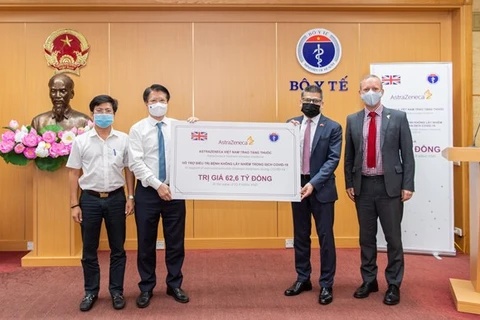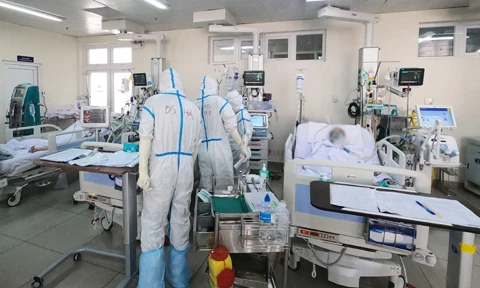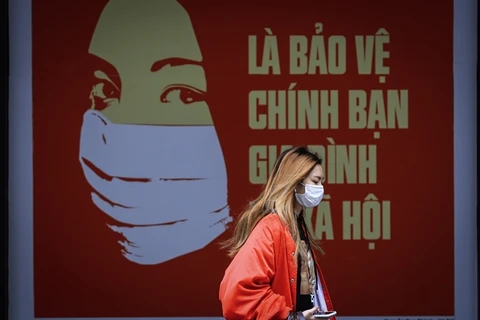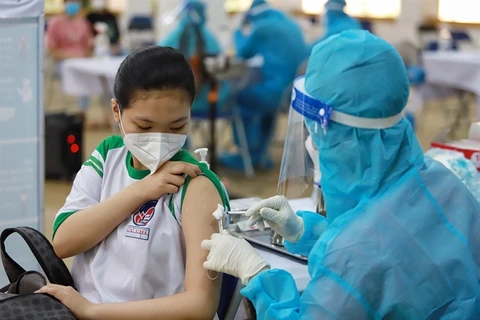Hanoi (VNS/VNA) - Health experts reviewed the regional progress of the implementation of the APEC Rare Disease Action Plan over the past few years, at a meeting in Hanoi on December 2.
The “Advisory Council and Experts Meeting on Rare Disease Management in Vietnam” was jointly organised by the Medical Services Administration (MSA) and the National Pediatrics Hospital.
At the event, experts also discussed the definition and list of rare diseases, as well as made presentations on rare disease diagnosis, treatment guidelines and management.
Participants heard that a Memorandum of Understanding (MOU) on “Improving diagnosis, treatment and management of specific rare diseases in Vietnam” for the period of 2018-23 was signed between the MSA and Takeda Vietnam in 2018. Since then, the MSA said that Vietnam has made great strides in diagnosing, treatment and the management of a number of rare diseases.
Vietnam has been progressing in efforts to study, approach and apply solutions in the treatment of rare diseases. This includes expertise sharing on rare-disease treatment; solutions to control and manage patients with Hemophilia leveraging technologies such as the Zero Bleed app piloted at the National Institute of Hematology & Blood Transfusion; and joining hands with the Vietnam Hemophilia Association to improve treatment and life quality for patients with blood clotting disorder.
Many workshops were organised for health care providers to raise awareness among patients and communities on rare diseases in Vietnam.
“Currently in Vietnam, there are specific therapies and medications for certain rare diseases that help improve the effectiveness of treatment and life quality for patients. The cooperation with leading names in this field has brought positive changes to patients, as well as paved the way for patients and health care professionals to access advanced treatment methods, enhancing the quality for rare diseases treatment in Vietnam,” said MSA Deputy Director Dr. Nguyen Trong Khoa.
Dr. Vu Chi Dung, director of the Centre for Rare Disease and Newborn Screening at the National Pediatrics Hospital, said: “In recent years, diagnosis and treatment of rare diseases around the world and in Vietnam have made considerable progress. The support from partners over the years has helped the hospital to strengthen awareness and understanding of how to treat patients before severe symptoms appear and mitigate the risk of death,”
Katharina Geppert, country manager of Takeda Vietnam, said she though that increasing access to innovative medicines for rare diseases was challenging and needed collective action.
"It must be approached in a sustainable and targeted way, to strengthen and transform healthcare systems, at every stage of the patient journey - from awareness and diagnosis, to treatment and ongoing patient support,” she added.
Geppert said that Takeda had worked with the Ministry of Health since 2018 to improve the diagnosis and treatment of patients with hemophilia and primary immune deficiency - two of the most prevalent rare diseases in Vietnam.
"The company will continue to execute our long-term strategies that empower breakthrough treatments, improving patients’ life quality and supporting Vietnam’s healthcare system," she said.
According to the World Health Organization, it is estimated that 1 in 15 people is diagnosed with a rare disease, and there are around 6 million rare-disease patients in Vietnam.
Nationwide there are about 100 rare diseases found in the community, according to the National Pediatrics Hospital./.
The “Advisory Council and Experts Meeting on Rare Disease Management in Vietnam” was jointly organised by the Medical Services Administration (MSA) and the National Pediatrics Hospital.
At the event, experts also discussed the definition and list of rare diseases, as well as made presentations on rare disease diagnosis, treatment guidelines and management.
Participants heard that a Memorandum of Understanding (MOU) on “Improving diagnosis, treatment and management of specific rare diseases in Vietnam” for the period of 2018-23 was signed between the MSA and Takeda Vietnam in 2018. Since then, the MSA said that Vietnam has made great strides in diagnosing, treatment and the management of a number of rare diseases.
Vietnam has been progressing in efforts to study, approach and apply solutions in the treatment of rare diseases. This includes expertise sharing on rare-disease treatment; solutions to control and manage patients with Hemophilia leveraging technologies such as the Zero Bleed app piloted at the National Institute of Hematology & Blood Transfusion; and joining hands with the Vietnam Hemophilia Association to improve treatment and life quality for patients with blood clotting disorder.
Many workshops were organised for health care providers to raise awareness among patients and communities on rare diseases in Vietnam.
“Currently in Vietnam, there are specific therapies and medications for certain rare diseases that help improve the effectiveness of treatment and life quality for patients. The cooperation with leading names in this field has brought positive changes to patients, as well as paved the way for patients and health care professionals to access advanced treatment methods, enhancing the quality for rare diseases treatment in Vietnam,” said MSA Deputy Director Dr. Nguyen Trong Khoa.
Dr. Vu Chi Dung, director of the Centre for Rare Disease and Newborn Screening at the National Pediatrics Hospital, said: “In recent years, diagnosis and treatment of rare diseases around the world and in Vietnam have made considerable progress. The support from partners over the years has helped the hospital to strengthen awareness and understanding of how to treat patients before severe symptoms appear and mitigate the risk of death,”
Katharina Geppert, country manager of Takeda Vietnam, said she though that increasing access to innovative medicines for rare diseases was challenging and needed collective action.
"It must be approached in a sustainable and targeted way, to strengthen and transform healthcare systems, at every stage of the patient journey - from awareness and diagnosis, to treatment and ongoing patient support,” she added.
Geppert said that Takeda had worked with the Ministry of Health since 2018 to improve the diagnosis and treatment of patients with hemophilia and primary immune deficiency - two of the most prevalent rare diseases in Vietnam.
"The company will continue to execute our long-term strategies that empower breakthrough treatments, improving patients’ life quality and supporting Vietnam’s healthcare system," she said.
According to the World Health Organization, it is estimated that 1 in 15 people is diagnosed with a rare disease, and there are around 6 million rare-disease patients in Vietnam.
Nationwide there are about 100 rare diseases found in the community, according to the National Pediatrics Hospital./.
VNA
























